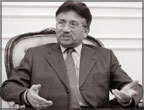|
DAILY NEWS ONLINE |
|
|
|
OTHER EDITIONS |
|
|
|
|
|
|
|
|
|
OTHER LINKS |
|
|
|
|
|
|
  |
Pakistan's religious parties losing ground?For the first time in decades, Pakistan's religious parties and organisations appear to be seriously threatened by Government measures to curtail their influence. This is evident from their increasingly belligerent tone towards President Pervez Musharraf in recent weeks.
Quazi Hussain Ahmed, chief of the Jamaat-e-Islami (the largest religious political party in the country), surprised political and diplomatic observers with his statement on August 29 that the six-party alliance of religious parties, Muttahida Majlis-e-Amal (MMA), would not participate in the October 2007 general election if Gen. Musharraf continued at the helm of affairs. Though Mr. Hussain has never enjoyed a good equation with Gen. Musharraf, such a sweeping assertion from him has brought to fore the growing unease among the religious parties over the Government's efforts to marginalise them. They see it as a grand design under pressure from the international community (read the United States). Since occupying centre stage in the polity in 1958, the Pakistan military has always considered the religious forces its natural ally. It was the military's patronage that gave the religious parties the clout they could never get through electoral politics. Gen. Musharraf was no exception. The MMA was actually dubbed the "Military Mullah Alliance" by the Opposition. The October 2002 general election was a dream one for the religious parties. They not only captured two provinces (the North West Frontier Province on their own and Balochistan in coalition with the pro-Musharraf Pakistan Muslim League) but also emerged as a major force at the national level. However, with growing international pressure on Gen. Musharraf to contain fundamentalist forces, the equations seem to be changing. The first hint came when Gen. Musharraf refused to sign a Bill seeking to enforce a Taliban type of code of conduct for citizens in the NWFP and referred the matter to the Supreme Court. The apex court declared some of the provisions ultra vires. Then the Leader of the Opposition and chief of his own faction of the Jamaat-e-Ulema-Islami, Fazlur Rehman was deported from the United Arab Emirates on August 1. A furious Mr. Rehman held the Government responsible for the act and threatened to spill the beans on the "export of militants" to Afghanistan. There was no reaction from Islamabad. Mr. Rehman later announced that the religious schools run by his organisation would not submit to the new procedure for registration and audit of their accounts. He accused Gen. Musharraf of defaming the religious schools and parties to earn brownie points from U.S. President George W. Bush. The growing gulf between the religious parties and Gen. Musharraf at the grassroots level was evident after the local bodies election. After the first phase on August 18, Gen. Musharraf claimed the religious parties had lost considerable ground. According to him, they managed to get less than 25 per cent of the popular vote compared with 75 per cent in 2002. At the end of the second phase on August 25, Gen. Musharraf declared at a rally in Karachi that "extremists" all over Pakistan had been rejected. It was the outcome of his campaign against them, he said. The travails of the religious parties continued with the Pakistan Supreme Court declaring that the certificates issued by religious schools could not be considered to be on a par with the tenth grade state board qualification to be eligible to contest the local bodies election. The MMA has been the worst hit by the verdict, which also has serious implications for the alliance in the context of the 2007 general election. Just before the October 2002 election, Gen. Musharraf had prescribed graduation as the minimum qualification to contest for the national and provincial assemblies. However, the MMA-backed candidates benefited most from the provision as the Government agreed to allow graduates of religious schools to contest the election. Now, following the Supreme Court verdict, the MMA has reasons to be concerned about the future. The apex court has been critical of the functioning of the religious schools and said they were being managed and run by the private sector without a statutory sanction and without affiliation to a recognised university or educational board. The detailed judgment, released to the press on August 29, said that the madrassas were not teaching their students even a single subject of general education, which could enable them to join the mainstream of society and compete for employment or any other purpose. Are all these developments signs that winds of change are blowing? Only time will tell. (The Hindu) |
|
|
|

